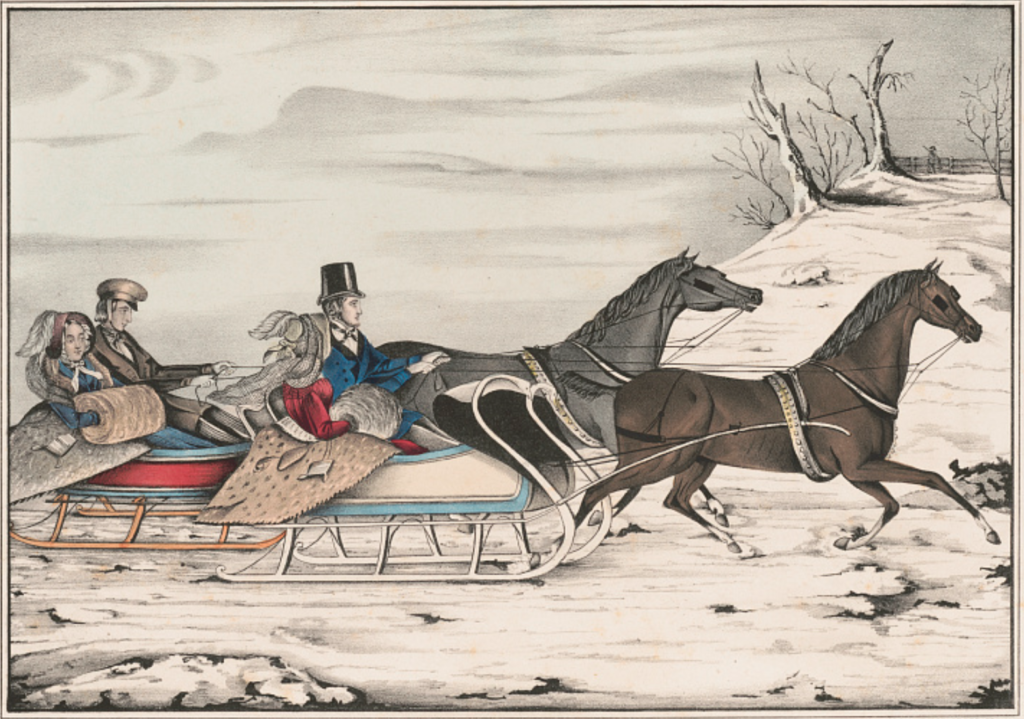You’d think a universally known little ditty such as “Jingle Bells” would have a pretty simple history, but on the contrary, it’s rather complicated. There is conflicting information about when it was written, why it was written, and two towns – one up north and one down south – have a long-standing disagreement over where it was written. We’ll get back to all that after we delve into who its author and composer was.
There is no question that James Lord Pierpont penned the music and lyrics. Born in Boston in 1822 to a Unitarian preacher, he held many stations in life. He became a whaler at age 14, then a Navy sailor, and returned home at age 21 to become a not-so-responsible father. He left his wife and two children, and returned home to his father in Medford, Massachusetts. Soon he was bitten by the gold rush bug and was off to find fortune in California. He got into trouble with the law there and owed a lot of angry people a lot of money, so rather than return to Massachusetts where he could easily be tracked down, he hightailed it to Savannah, Georgia, where his brother, Rev. John Pierpont Jr., was a minister.
In 1861 he became a Confederate cavalryman while his father served with the Massachusetts infantry as a Union chaplain. During the Civil War, Pierpont penned Southern war anthems, none of which ever rose to the fame of “Dixie” and are long forgotten.
But before the war, in the 1850s, he wrote “One Horse Open Sleigh” and it was published in 1857, copyrighted while Pierpont lived in Savannah. It was also in Savannah where Pierpont met and married his second wife, who was the daughter of the city’s mayor.
Medford, Massachusetts believes that he wrote about a sleigh race that happened every year there, that Pierpont had a girlfriend called Fanny Bright who is mentioned in the song, and that the song was written on a piano at a local inn after the sleigh they were riding in tipped over.
Truth be told, it may never be known exactly where song was written. It could be Medford, Savannah, or neither. It could have been written in 1857 when it was published or some time earlier.
Scholars agree that it was not meant to be a Christmas song, as there is no mention of the holiday at all in the lyrics.
The song has been recorded and interpreted by hundreds of artists over the years. In 1970, Pierpont was inducted into the Songwriters Hall of Fame and legend at the time had it first being performed at a Thanksgiving church service. That’s been discounted considering the risqué anti-Victorian nature of the later verses of the song.
The last three verses:
A day or two ago
I thought I’d take a ride
And soon, Miss Fanny Bright
Was seated by my side,
The horse was lean and lank
Misfortune seemed his lot
He got into a drifted bank
And then we got upsot.
A day or two ago,
The story I must tell
I went out on the snow,
And on my back I fell;
A gent was riding by
In a one-horse open sleigh,
He laughed as there I sprawling lie,
But quickly drove away. Ah!
Now the ground is white
Go it while you’re young,
Take the girls tonight
and sing this sleighing song;
Just get a bobtailed bay
Two forty as his speed
Hitch him to an open sleigh
And snap! You’ll take the lead.
If you read through to the end, it’s obvious the song is about a bunch of young guys taking their girls out for some wild fun, racing their sleighs until an inevitable accident happens. It celebrates the drag racing of its era, not exactly something a choir would sing about in a chapel.
But worldwide, “One Horse Open Sleigh” became the most popular holiday song in history, now known as
“Jingle Bells.”



